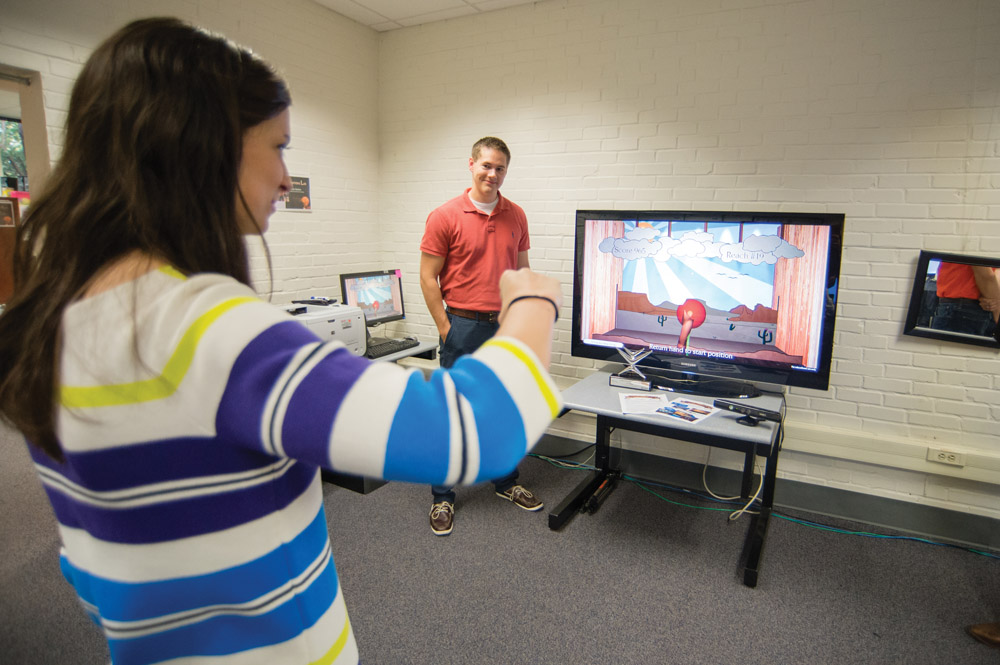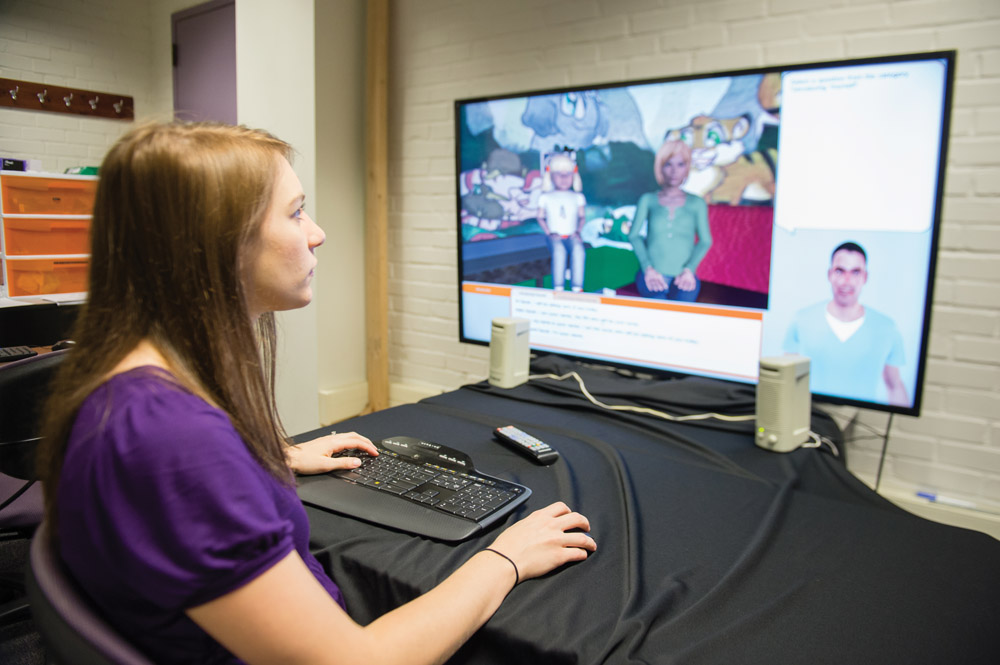Punching out impairment
by Brian Mullen and Peyton Bullard
Virtual patients, actual learning
A simulation helps nurses talk to kids.
Simulations, it turns out, are handy not just for treating patients but for talking with them as well. Currently, the most commonly used training method for student nurses to practice their patient interviewing skills is reenacting written scenarios with classmates, where one student acts as the patient and the other acts as the nurse. But some student actors are better than others, and computer simulations, researchers thought, might improve the training.
Larry Hodges, professor in Clemson’s School of Computing, and two graduate students, Toni Bloodworth Pence and Lauren Cairco Dukes, are working with Nancy Meehan from Clemson’s School of Nursing and Arlene Johnson from The College of St. Scholastica to develop a computer-based simulation to help nurses learn how to interview patients.
The simulation, called SIDNIE (Scaffolded Interviews Developed by Nurses in Education), is designed to teach nursing students how to interview pediatric patients by providing interview practice with guidance and feedback from a virtual agent named Sidnie.
“The nurses are graded on two criteria, first that the terminology used is age appropriate and second that it’s unbiased, since children are easily influenced and persuaded,” Cairco Dukes says. “The method has the potential to provide an efficient pathway for nursing students to achieve some level of competence in interviewing techniques before they reach the clinical setting.”
SIDNIE is now being used by Clemson’s School of Nursing for experimental evaluation. The students plan to publish their findings and make them available to therapists and patients.
This video game will help stroke patients regain arm function.
After a stroke, the name of the game is rehabilitation. But for many stroke survivors, the routines of rehab may soon include a new kind of game: Duck Duck Punch.
Written for patients to use with personal computers, the video game is a playful answer to a serious problem: What is the best way to help survivors regain function?
Larry Hodges, a professor in Clemson’s School of Computing, leads multiple projects in medical informatics, and his research group teams clinicians and computer scientists to create software systems to improve health care. With graduate students Patrick Dukes and Austen Hayes, Hodges collaborated with Michelle Wood-bury at the Medical University of South Carolina (MUSC) to create a rehabilitation game for stroke survivors.
“On average there are approximately eight hundred thousand strokes per year in the United States, and over 75 percent of stroke survivors have some form of arm movement impairment,” Hayes says. “Current rehabilitation exercises target the one in four stroke survivors who have moderate impairment, and stroke survivors are only provided with two to three months of therapy due to insurance.”
Duck Duck Punch, which patients play on a computer with a Microsoft Kinect sensor, is designed to help stroke survivors regain upper arm movement. After a therapist calibrates the system for the correct level of impairment, the patient begins playing the game, reaching out to punch carnival-style ducks as they appear on the screen.
Ten stroke survivors participated in a pilot study at MUSC. At the end of the study, the researchers found significant improvement in arm mobility.
“Patients wanted to come back day after day, participating in sessions much longer than they usually would with better results,” Dukes says.
Duck Duck Punch took second place in the Kinect Fun Labs Challenge, one of eight competitions held as part of the tenth annual Microsoft Imagine Cup. Over 500 teams from around the world initially entered the competition by writing a project proposal. Some 100 teams were then asked to submit working software, a user’s manual, a written paper, and a video describing their application. The top three teams were awarded a free trip to the final competition, in Sydney. Of the 24 teams who were awarded first, second, or third place in one of the eight competitions, only two were from the United States.
Dukes and Hayes are currently working with the Clemson University Research Foundation on licensing Duck Duck Punch and plan to launch a start-up company to market the product.
Larry F. Hodges is a professor in the Human-Centered Computing Division of the School of Computing, College of Engineering and Science. Brian Mullen is the communications director for research. Peyton Bullard is a senior majoring in marketing. Photos by Craig Mahaffey.




